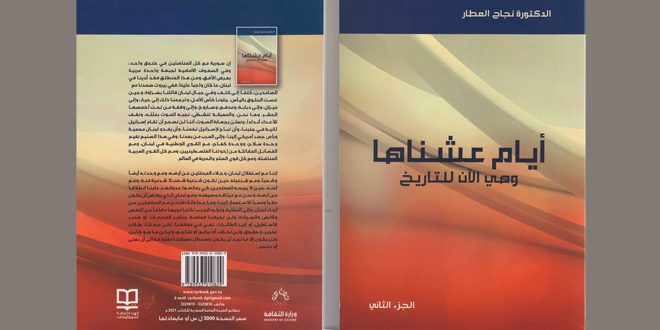“History repeats itself”, is the phrase that we will repeat often as we read the second part of Dr. Najah Al-Attar’s book “The days we have lived and are now history” [ In Arabic language]. She recalls, in articles she wrote while she was Minister of Culture, several issues starting with the conflict with the Zionist enemy and American plans against our region and ending with the Syrian cultural reality.
The major events that occurred in the eighties were the main points in the book’s articles, which were formulated in a bold and frank language that revealed the state of the Arab nation and the extent of the conspiracy affecting it , anticipating a future that would carry a greater danger if the Arabs did not pay attention to what is being planned for them.
Dr. Al-Attar indicated through her articles that the saying, “the constants of Syrian politics are a reality and a solid foundation,” has enabled Syria to confront the dangers it has faced and to foil all the schemes that sought to weaken and divide us forty years ago. It stressed that we can, while preserving our principles, values and rights, prove that our country is worthy of life and progress.
Dr. Al-Attar’s words make the reader feel that the method of steadfastness is one because the enemy has not changed and its goal has not changed either, even if the names and forms have changed.
She wrote; “Betting on America is a loss because one does not bet on his enemy.”, emphasizing that Syria, which since the Correctionist Movement announced a clear slogan to keep the Arab cause alive based on important pillars such as fixing the imbalance in the strategic balance against the enemy, establishing balanced relations in the international field, and working for struggle solidarity in the Arab field.
In an article she wrote on the occasion of the first anniversary of the Sabra and Shatila massacre, Dr. Al-Attar begins to lament the martyrs of this massacre, who are Palestinian refugees.
She described it as a “bloody massacr” committed by the Israeli occupation forces and Lebanese factions, warning that if this aggression is not curbed, none of the Arabs will be able to escape from it and it will repeat his crimes against us.
In other articles, Dr. Al-Attar writes about martyrs’ sons and daughters’ schools as a scientific and knowledge edifice that embraces the sons of those who were martyred while defending the homeland with their blood and their souls. She indicated that the idea of establishing this institution, which we do not find parallel in advanced countries, was of the late leader Hafez al-Assad, who sponsored it and gave it most of his attention and time.
Dr. Al-Attar had warned against the consequences of the Iraq-Iran war on the region, especially the Arab Gulf, so she wrote about it in 1982, describing it as an aggressive war that broke out on behalf of America and for its interest and the interest of the Zionist occupation entity and the Arab regimes that follow them. She emphasized that this war does not serve the interests of the Iraqi people, the Arab nation, or even the Palestinian cause.
Former Minister of Culture Dr. Al-Attar allocates many articles in the second part of her book to the Lebanese file, both in terms of the civil war in Lebanon and the Zionist occupation of large areas of this country, as well as the involvement of Lebanese parties in fueling the war and supporting the occupation and conspiracy against Syria.
She focused in the conclusion of her book on the Syrian cultural sector, as she reviewed, during an interview with Tishreen newspaper in 1984, the achievements of this sector despite the dangers that our country went through, thanks to the slogan adopted by Syria since 1970, which is “Culture for all.”
During the interview, Dr. Al-Attar highlighted the remarkable development that the Syrian culture sector has witnessed.
This development, as she said, was manifested in the launch of international festivals such as the Bosra Festival, the Damascus Film and Theater Festivals, the establishment of the Al-Assad National Library, the revival of Arab heritage, in addition to the many achievements in the field of antiquities and museums; carrying out excavation and restoration works in various parts of Syrian, inducting cultural centers in various regions, founding the Higher Institute of Dramatic Arts, supporting the Cinema Foundation, whose films have won international awards, organizing hundreds of art exhibitions, and publishing and printing hundreds of books and cultural and specialized magazines.
The 304-page book is part of a project that Dr. Al-Attar is working on to document her intellectual, literary , and political visions during the last three decades of the last century.
“The Days We have Lived, which are now history,” was issued by the Syrian General Book Organization.
Amal Farhat

